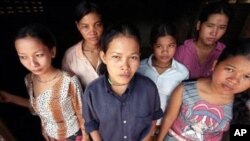In June, the U.S. State Department released the 14th annual Trafficking in Persons - or TIP Report. The report is a diplomatic and policy tool that evaluates governmental efforts to combat labor and sex trafficking. This year it analyzed efforts to combat trafficking in 188 countries and territories, including 29 in the Asia-Pacific region.
“While there's progress, with more than 20 million estimated trafficking victims in the world and fewer than 45,000 victims identified, we know that we all have a lot more to do,” said Ambassador-at-Large for Trafficking in Persons Luis CdeBaca, in testimony before the U.S. Senate subcommittee for Asian and Pacific Affairs:
“We see both sex trafficking and forced labor -- even state-sponsored forced labor in the recruitment and the use of child soldiers in some places -- and pervasive victimization of migrants seeking better jobs. These are real people, people trapped in slavery, people in the sights of traffickers, people recovering from the trauma of being trafficked. They don't just impact our foreign policy; they touch our conscience.”
Speaking before the same subcommittee, Principal Deputy Assistant Secretary for East Asian and Pacific Affairs Scot Marciel noted that “As a direct result of the annual TIP Report and sustained U.S. engagement, some foreign government officials no longer ask for the definition of trafficking or for proof that it exists within their respective borders. Rather, many officials are now asking what steps they can take to improve their anti-trafficking efforts.”
The United States works with governments in their efforts to combat modern slavery and develop policies and guidelines for conducting undercover investigations of human trafficking. In the Pacific Islands, we are encouraging local government efforts to address forced labor on fishing vessels. And we are working together with the Association of Southeast Asian Nations, or ASEAN, to enhance our partnership in combating the scourge of human trafficking.
Combatting human trafficking is a top U.S. priority. We are committed to working with governments and civil society in the Asia-Pacific region and around the world to prevent trafficking, protect victims, and prosecute traffickers so we can rid the world of modern slavery.






